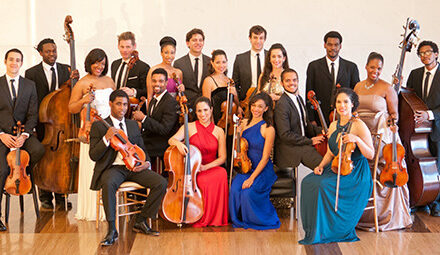Record collectors fondly remember keyboard recordings of Peter Frankl. Retiring after 30 years of teaching at Yale University, this was a wonderful chance to hear him in live concert. He was joined for this concert in Hill Hall’s Moeser Auditorium by pianist Mimi Solomon and violinist Nicholas DiEugenio, UNC Chapel Hill Department of Music faculty members, and students of the Mallarmé Youth Chamber Orchestra alongside student mentors from UNC. The featured composers were Brahms, Schumann, and Mozart. Frankl was the Kenan Guest Artist, and this concert was the culmination of a weeklong period of multilevel mentoring. Solomon studied piano with Frankl at Yale while DiEugenio was coached in chamber music by him.
The concert opened with the original piano four hands version of Sixteen Waltzes, Op. 39, by Johannes Brahms (1833-97). The composer, by altering the keys from the original, made two versions (easy and difficult) for solo piano which are more often performed and recorded. Waltzes were “hot” in 1860s Vienna. Publisher C.A. Spina brought out the posthumous first edition of Franz Schubert’s Twelve Ländler for Piano, D.790 (edited anonymously by Brahms), in 1864. These served as models for Brahms’ own cycle of 16 which appeared in August 1865. The composer applied his characteristic developing variation to seeming simple melodies in the recapitulating binary form.
Solomon was seated at the lower range of the keyboard while Frankl was seated at the treble end. Ensemble was as flawless as it was seamless as each waltz merged into the next. Their palette of tone and dynamics was remarkable as each shift in melody and rhythm was given strong characterization.
Next came Sonata No. 1 in A minor for Violin and Piano, Op. 105, by Robert Schumann (1810-56), which is seldom heard in recitals. It was composed between September 12-16, 1851, and officially premiered by Clara Schumann with violinist Ferdinand David in March 1852 in Leipzig. She liked its elegiac first movement and charming second. Its movements are marked: “Mit leidenschaftlichem Ausdruck” (With passionate expression), Allegretto, and “Lebhaft.”
DiEugenio’s fiery performance was closely matched by Frankl’s. DiEugenio’s full, rich tone was paired with precise intonation and attack. The exquisite simplicity of the second movement was conveyed beautifully. The give-and-take between the two was a constant pleasure. Their clear articulation of the agile finale was rewarded with sustained enthusiastic applause.
After intermission, the 23 MYCO players and their UNC mentors surrounded the Steinway grand for Piano Concerto No. 12 in A, K. 414, by Wolfgang Amadeus Mozart (1756-91). This was one of three concertos the composer used to advance his career in Vienna after being kicked out of the Archbishop of Salzburg’s service. It, K.413, and K. 415 were performed at his Lenten concerts of 1783. The original score calls for solo piano, strings, and pairs of oboes and horns or, to encourage more performances, merely a quattro with the solo keyboard instrument. (This performance eschewed wind instruments.) The three movements are marked: Allegro, Andante, and Allegretto. The last two pay homage to the recent decease of Mozart’s mentor, J.C. Bach. The Andante quotes four bars of a melody by the “London Bach,” while finale is modelled in Bach’s style.
DiEugenio led the student ensemble ranging in age from 13-18, and his intensive preparation was evident in the high quality of ensemble and intonation during the concerto’s introduction. Frankl’s playing was a constant delight, elegant with crystalline clarity and complete mastery of style. There were thrills aplenty in his trills! The string accompaniment was very good, nicely balanced with the keyboard, elegantly phrased with apt attention to dynamics. Frankl’s spinning out the interweaving of the melodies in the cadenzas was marvelous. Which Mozart’s two alternative cadenzas used was not identified in the program. This winning performance was rewarded with multiple curtain calls from the large standing audience.
I hope more will be made of Frankl’s talent in future UNC seasons!











